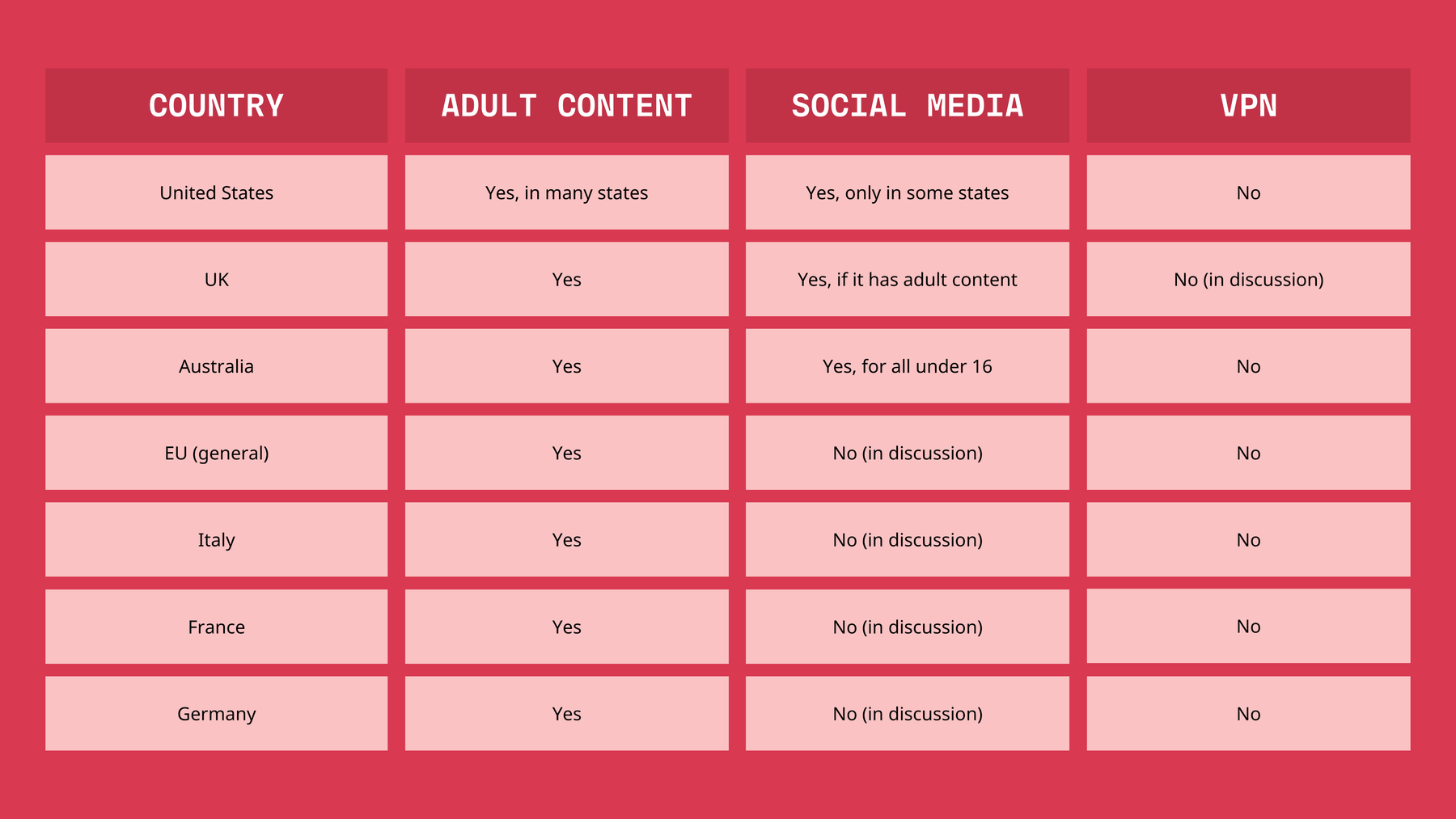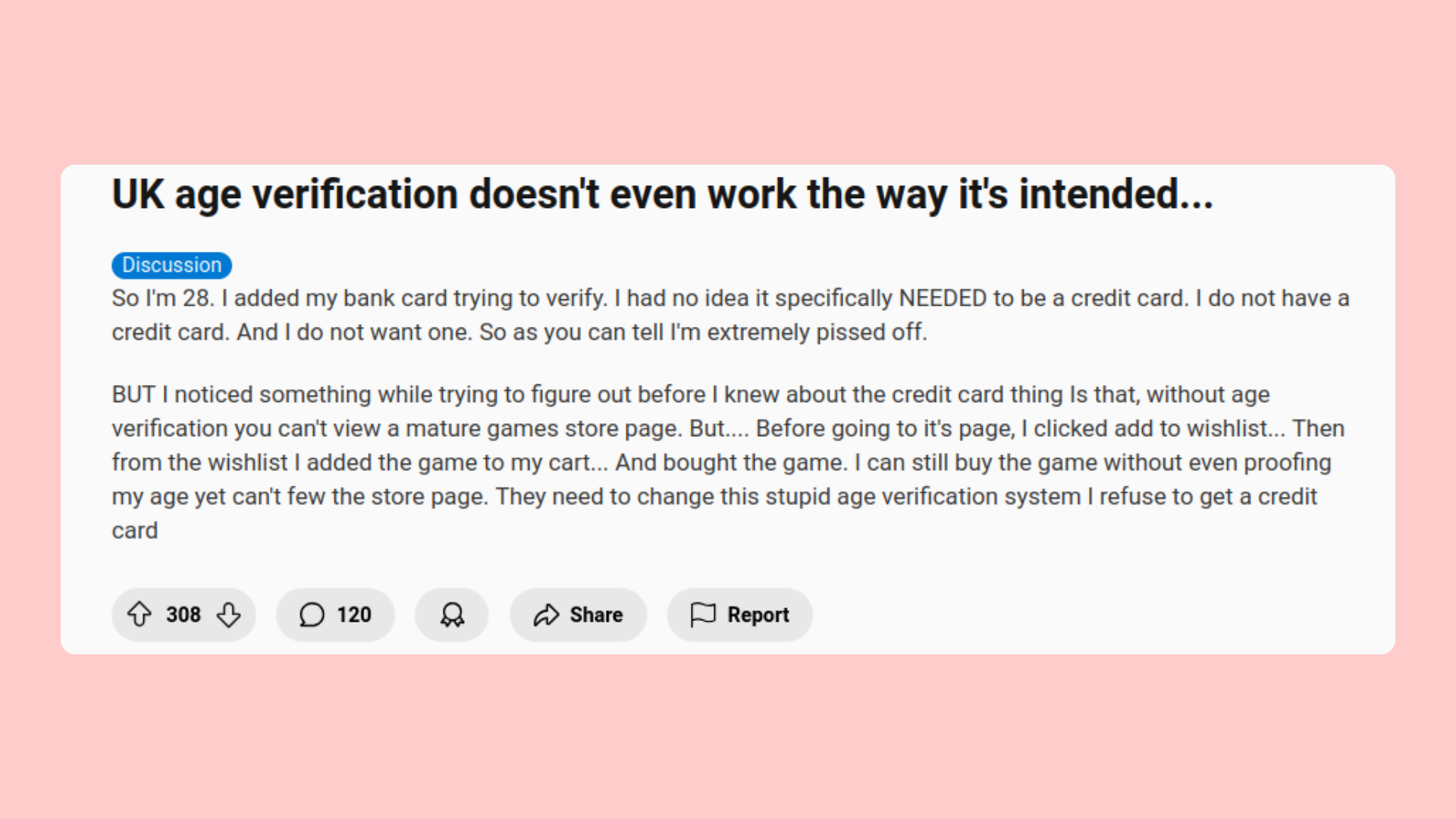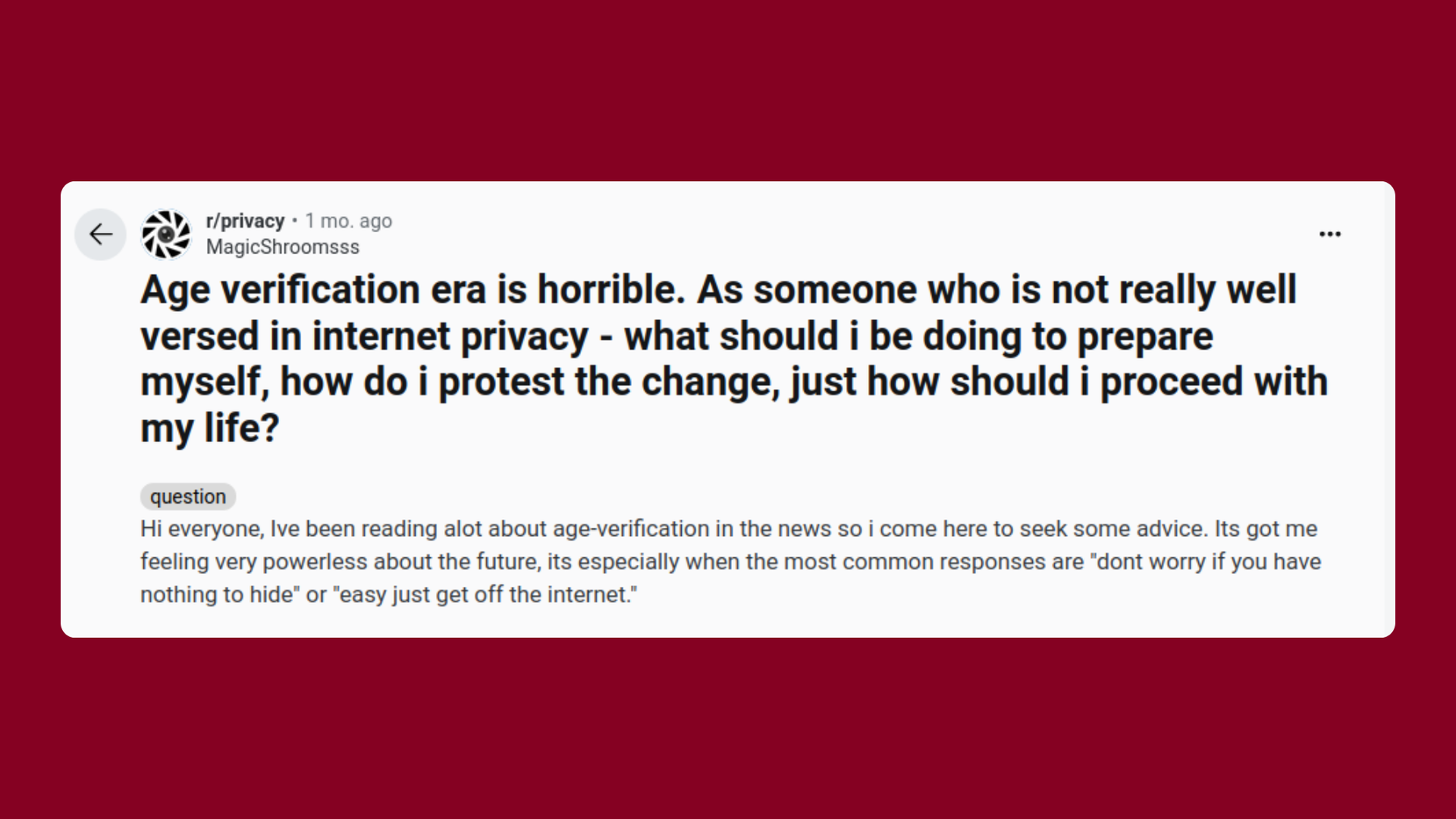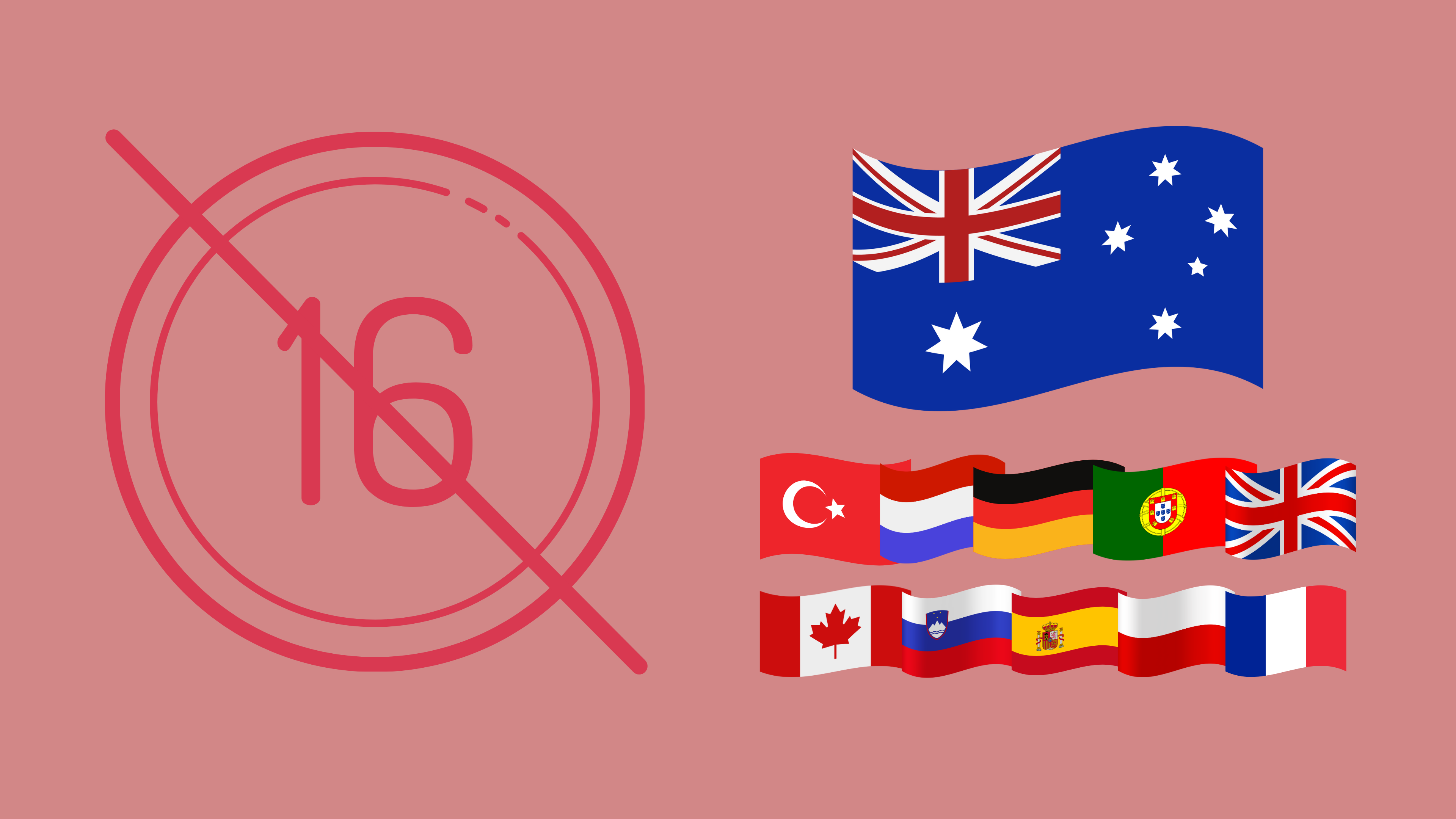Age Verification: What countries require you to perform ID checks & for what websites and platforms?
Will the age verification era kill anonymity? More countries are passing age verification laws, now also for social media apps as seen in Australia and upcoming in the UK, France, Spain, and Turkey. So let's take a look at what countries already require it, and for what services, online sites,and social media platforms.
Countries with age-verification laws
Age verification has been around for decades already, for instance for sites with explicitly adult content like porn or violent games. But now, many countries are also requiring age verification for other websites and platforms, such as YouTube, Steam, Instagram, and Roblox. Let’s check the situation worldwide.


United States
There’s no single federal age-verification law for general online services in the USA. But a lot of states require age verification for online gambling, online pornography, or other adult content. Louisiana, Utah, Mississippi, Missouri, Virginia, Arkansas, Texas, Montana, North Carolina, Idaho, Kansas, Kentucky, Nebraska, Indiana, Alabama, Oklahoma, Florida, South Carolina, Tennessee, Georgia, Wyoming, South Dakota, North Dakota, Arizona, and Ohio require age verification via an ID card for online pornography. This first state that introduced age verification was Louisiana in 2023.
However, age verification laws do not stop there. In Ohio, Mississippi, South Dakota, and Wyoming the laws are phrased more broadly so that they can also include social media platforms, or any platform that hosts adult content. To date, not all social media services require age verification in these states, but BlueSky is asking its users to do a face check via a verification company called Yoti, or submit a photo of their credit card to proof that they are over 18 years old.
United Kingdom
The UK’s Online Safety Act was passed in 2023, and even though it was heavily criticized by privacy groups and legal experts, the regulations introduced with it are slowly changing the online landscape in the UK. The deadline for certain websites to implement stricter age verification was on July 25, 2025.
The Online Safety Act places a duty of care on tech companies to protect children from inappropriate material, hate speech, bullying, child sexual abuse material (CSAM), and fraud. Services like social media, websites, search engines, online forums, and dating services (in addition to porn and gambling sites) are now required to implement stricter age verification systems. Even if the service is located abroad, it needs to comply with the UK law if it has a large number of UK users or if the UK is a target market.
Now, users in the UK can no longer simply click the box to confirm they are over the age of 18 for a quick age check. To access websites or services with content that classifies as restricted for children, users will have to prove their age through different methods, for example, facial recognition, uploading their IDs, or by credit card verification. If sites don’t comply with these new age checking regulations, they may be fined up to 18 million pounds or 10% of their worldwide revenue.
In the UK, Pornhub, xHamster, RedTube, and 600+ other adult site are fully blocked unless you verify your age. There is no blanket ban of social media sites like in Australia, but many online services block certain content or the option to message other users if age verification was not passed, such as Reddit, Bluesky, Discord, X, Spotify, and others.
Since beginning of 2026, the discussion on putting social media apps behind an age verification check is getting more heated in the UK. The House of Lords has already voted in favor of a ban similar to Australia, and lots of other politicians are also in favor of requiring age checks for social media apps.
Australia
Australia introduced age verification not only for pornography and online gambling, but it was one of the first Western countries that uses age verification to block minors from using social media completely. On December 10 2025, an Australian age verification law enforced that major social media platforms like Facebook, Instagram, TikTok, X (Twitter), YouTube, Snapchat, Reddit, Threads, Twitch, and Kick, have to block under-16s from having an account. The scope of the law can be increased to search engines and other sites to make sure minors do not get in touch with age-restricted content such as pornography or self-harm.
Turkey
Turkish politicians are now also calling for age verification on social media apps and other sites. The question is whether these ID checks are really only necessary for proving ones age, or whether the government will also use the information to identify individual social media users, for instance if they are political activists or opponents. This is a dangerous development that will endanger many people around the world.
Canada
Canada, similar to most Western countries, now also plans an age verification bill, Bill S-209, but is criticized for repeating the same mistakes as the UK with this draft law.
European Union
The Digital Services Act (DSA) requires very large online platforms to ask users for age verification checks where needed to mitigate risks to minors. A simple self-declaration, for instance “I am 18” is not sufficient for site with adult content such as pornography, extreme violence, and similar material. Yet, member states of the European Union can impose stricter national rules, and some already have. Let’s break it down!
Italy
- Italy requires mandatory age verification for adult websites (pornography and other 18+ content).
- Adult websites are not allowed to promote VPNs as a workaround.
France
- Adult websites must implement age verification via ID-check or an equivalent system.
- Non-compliant websites can be blocked at the ISP level.
- Several large adult platforms temporarily withdrew from the French market to protest against this law.
- Since beginning of 2026, France is discussing age verification for social media similar to what Australia did in December 2025.
Germany
- In Germany, the requirement for age verification for pornography and similar online content has been there for years.
- Age checks via simply ticking a box that someone is “above 18” are not sufficient for such websites.
- German ruling parties CDU, and now also the SPD, are in favor of banning minors from social media. A decision, however, is postponed until mid of 2026.
Spain
- Spain requires age-verification mechanisms for explicit adult content, such as porn.
- Spain is developing a national digital identity tool to do these age verification checks.
- Spain announced plans to ban social media apps for kids and teens similar to the Australian legislation that is already in place.
Slovenia
- Slovenia is currently drafting a law that would ban children under the age of 15 from accessing social media.
Poland
- Poland want to launch a tool by the end of 2026 so that children can no longer access social media platforms.
Netherlands
- The new Dutch minority government wants under 15-year olds banned from social media, but it goes further than most countries: The Netherlands not only plans such laws for itself, but it also pushes for a similar regulation on EU level.
Portugal
- Portugal’s parliament has approved a law that will ban under 16-year old from accessing social media sites. But children above the age of 13 should be able to use social media with “verified parental consent”.
European Union & Chat Control
Additionally, the the trilogue discussions about Chat Control are starting in February 2026, and it will be a tough battle on age verification. While the EU Council wants to broaden the services that would need to perform age verification, the EU Parliament stands against these plans. The EU Parliament rejects mandatory age checks for messaging apps and social media platforms and wants that online anonymity remains available.
What content requires age verification online
Adult content such as pornography, self-harm, and extremely violent content require age verification in all countries analyzed in this article. But, the kinds of content that require age verification vary based on the laws of the country or region. This means that the types of content that do or don’t require users to verify their age are dependent on jurisdiction. Sometimes the laws only apply to pornography, sometimes also to socials media platforms explicitly, and sometimes the laws are more broad and any website or service provider must decide for themselves whether age verification is needed to adequately protect children so that heavy fines are not imposed on them.
But because age verification laws are being introduced globally at an impressive speed, the situation changes constantly.
Some examples of the content requiring age checks, under UK’s Online Safety Act include:
- Platforms (websites, apps, and social media) that show explicit content like porn, for example, PornHub.
- Platforms with content that promotes, encourages, or gives instructions for self-harm, suicide, and eating disorders.
For example, YouTube has introduced an AI age verification system and Meta has already introduced Meta Teens Accounts that have a multilayered approach to checking a user’s age and are intended to protect teens from online threats and harmful content.
Check here if you’d like to know how to circumvent YouTube’s age verification check.
Will age verification work?
The USA, the UK, Europe, and many other countries are currently discussing introducing or tightening existing age verification laws. Australia has banned teenagers under the age of 16 from using social media platforms, the EU recently released a strategy blue print for age verification that could lead to similar legislation, and in the US, different states have also implemented age verification. In most cases, age verification does come with the good intention of protecting children, but it also comes with a huge problem: When people need to register to use certain websites, this gives companies and governments a lot of power over citizens, leading to mass surveillance and loss of privacy.
Plus, age verification might not even work the way it is intended: With age verification, legislators want to make it impossible for people under age to access age-restricted content. But this does not mean it will stop young people from accessing explicit materials, forums, or dating sites completely. For example, virtual private networks (VPNs) are an easy solution to access sites from a different geographic location and avoid giving up your identity to verify your age. And in the UK, VPN usage has greatly increased.


With the introduction of stricter age verification in the UK, people have shared their concerns, opinions, and how the verification doesn’t work the way it’s supposed to. Image: Reddit
Problem with VPNs
Age verification is only required in certain jurisdictions, thus, it’s fairly easy to circumvent any block based on ones’ age with the help of a VPN. For example, the BBC reported that VPN apps were the most downloaded apps on Apple’s App Store in July 2025 in the UK, after popular sites like X, Reddit, and PornHub implemented age verification checks. In response to this, Rachel de Souza told the BBC Newsnight that VPNs are, “absolutely a loophole that needs closing” and also called for age verification methods on VPNs. The BBC later reported that a government spokesperson said VPNs are legal tools for adult use and there were no plans to ban them.
With easy ways to bypass age verification checks, for example by using VPN services, it’s worth questioning if age verification can actually protect children, or if forcing all individuals to verify their age does not help at all, but only causes harm by killing anonymity and introducing privacy risks.
By now, however, countries, like the UK, discuss whether VPNs itself should be forced to perform age verification checks on their users.
Privacy risks
If sites are required to collect sensitive data of internet users by screening their faces or collecting their IDs, users are required to trust that their personal data is securely stored and not used for surveillance. But there’s no guarantee for that. Big Tech and other companies have demonstrated time and time again that they are more than happy to collect as much data about their users as possible to create profiles of them and post targeted ads. In addition, the young history of the internet has had loads of cases when online services suffered data breaches or secret services like the NSA requested citizens’ data – even without a warrant.
Plus, once this highly sensitive data is stored centrally at some service’s server, this server becomes an interesting target for malicious attackers. Late 2025, a third-party vendor that handled ID checks for Discord in the UK got hacked and the government ID photos of 70,000 users could have been exposed. This shows that age verification is not only a privacy risk, it is also a severe security risk.
Destroying anonymity
While anonymity and privacy are not the same, they are closely interlinked. Privacy is a human right and is guaranteed to everyone in a democracy, also because it is the basis for freedom of thought and freedom of speech – the foundation of a functioning democracy. Oftentimes, anonymity is seen as a crucial part to achieve privacy and to protect one’s identity from being exposed and put at risk, which is particularly important for human rights activists, political opponents in oppressive systems, whistleblowers, and journalists.
The internet should be a place to search the web and remain anonymous, particularly for these vulnerable groups. But implementing age verifications like we’ve seen in the UK removes anonymity. Because internet users know they need to verify their age, which in most cases leads to their whole identity being disclosed, it will lead to people being afraid to search the web freely. For example, if the user is queer and lives in a country where being queer is illegal, they may firstly be too scared to find communities and forums relating to LGBTQ online, and even worse, could face censorship from their government.
What becomes clear is that the increased trend of countries to implement strict age verification laws will create an internet that’s less private and less free.


A worried Reddit user shares how they feel “powerless” about the “age verification era”. Image: Reddit.
Problem with ID checks
If the age verification requires ID checks, it will restrict and limit those who do not have government issued IDs. Advocates for age verification often respond that if users do not have IDs, there are still other verification methods easily available to use, for example, using AI to estimate one’s age after uploading a photo or checking financial or internet histories. However, all of these checks are highly invasive and are not always accurate. For example, software to estimate age is often inaccurate for women and minority groups. Plus, it’s not a given that website owners will enable different forms of age verification or possibly only give the option to verify ones age through ID checks.
No solution
Governments around the world are right in wanting to protect children from harmful content, but age verification is not the solution: Age verification fails to do what it’s supposed to achieve – protect children – and at the same time, it destroys the free and open nature of the internet.
What becomes evident from the heated discussion about age verification is that a solution that ends online privacy for everyone is no solution at all.


